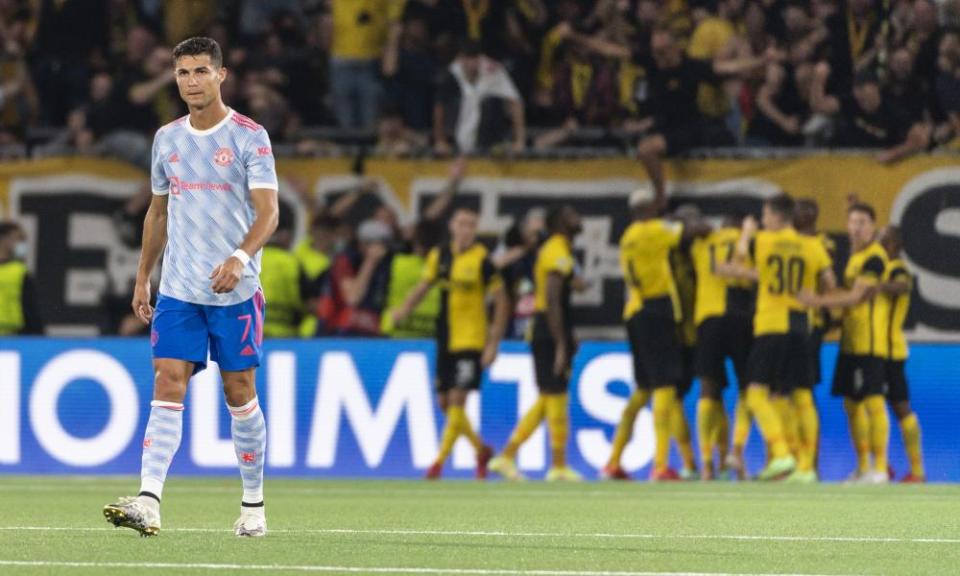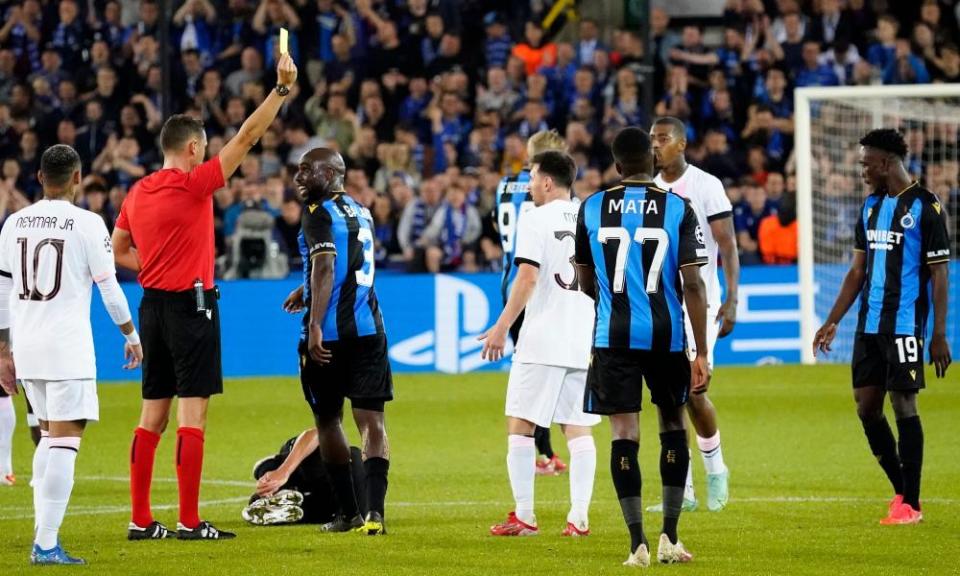We should relish results that jolt the toxic Ronaldo and Messi fanfare
When talking about Young Boys of Berne, who are always funny, and always funny in exactly the same way, it is important to remember that Young Boys are in on the joke. In fact it was their joke in the first place, the club’s name coined in 1898 as a wry dig at Old Boys of Berne, the chief footballing power in the city.
Needless to say the same goes for the other half of everyone’s favourite midweek football gag, the Wankdorf Stadium, home of Young Boys which is itself a nod to Old Boys’ legendary Stadion Masturbatorix in the northern suburb of Frig.
It was heartening to see Young Boys channelling that same punkish spirit into victory over Manchester United in midweek, an occasion that had been billed as the coronational return in the Champions League of football’s grandest marketing device, Cristiano Ronaldo.
Young Boys have only once spent more than £3m on a player. Had all gone to plan they would no longer be allowed to even play Manchester United, because this isn’t what US hedge funds consider legitimate A-list sportertainment product.
In the event Young Boys were agreeably vigorous and uppity. As were the players of Club Brugge the following day faced with Lionel Messi vehicle Paris Saint-Germain, who fielded the most lavishly fanfared front three in football history. A 1-1 draw felt like something astringent and quietly necessary, a reminder of the basic robustness, even now, of this beleaguered old miracle product. Because let’s face it, there is something grotesque about both these signings.
Related: Manchester United’s latest failure looks less a blip than part of a pattern | Jonathan Liew
This is an unfashionable view across much of the British sports media, where the general mood around Ronaldo’s arrival in Manchester has been forelock-tugging triumphalism, sales frenzy and a kind of tearful abasement at the celebrity shrine.

And yet it is clearly a weird move on a pure sporting level. United scored 83 league goals last season. Did anyone, anywhere look at that team and think: yes, not bad, but what they really need is a very old centre-forward? The final piece in this puzzle is a non-pressing poacher with a confusing personal gravity. Summon Fred. We are now complete.
But then signing Ronaldo was never about football, no matter how many times awed ex-pros tell us about his presence, his dessert trolley cachet, his “habits”. There is a mixture of off-field stuff in action here. For all the obvious branding talk and the heritage stuff United’s ownership basically signed Ronaldo because their fans were blockading the stadium in early summer.
Faced with this insurrection the club offered up Ronaldo in the style of a middle-aged CEO who buys his wife a Tiffany necklace six months after she discovered his texts to his secretary. Take the shiny thing. Don’t think about, you know, the other stuff.
Not that everyday supporters are excessively star-struck or jazzed out of their minds over all this. Brandishing a cardboard cut-out of Ronaldo looking, as ever, like a heroic robot fighter pilot from the 27th century is basically a funny thing to do on a day out. It is the media who really seem to have been driven nuts.
This week we had the sight of Gary Neville and Jamie Carragher exhuming the corpse of the great Messi v Ronaldo debate, wrenching it up out of its shallow grave, jamming a couple of wires into its sockets and marching it around the Sky Sports studio, teeth chattering, twirling its skinny hand.
PSG signed Messi as a kind of high-status good, a human super-yacht for the state of Qatar
Behold! It lives! Kind of! Neville and Carragher are brilliant, illuminating sports broadcasters, and expert bullshit detectors. But in the wash of Ronaldo’s debut Neville seemed genuinely convinced the whole of Manchester, not to say the nation, has been re-energised by the reappearance of a 36-year-old Instagram megastar. Which may well appear to be the case if you own a luxury hotel just over the road from his new employers, but seems loopy and off with any kind of distance.
But then Ronaldo is a confusing figure at this stage in his sporting life, a dying star still giving out light and heat. There was a glimpse of this disorientation in Berne as Ole Gunnar Solskjær left Ronaldo on the pitch with United a man down, for reasons that seemed rooted mainly in ego-management, star wattage and the curating of the product.

This kind of thing has always been present but it deserves to be called out and rejected as toxic, a corruption of the spectacle. How many steps from here towards light entertainment, YouTubers boxing, or the thing Solskjær’s bosses wanted in the first place, a closed TV product with guaranteed celebrity screen time? Which is fine. But it isn’t really sport. And to some degree the same goes for Messi to PSG. Messi has enough surplus brilliance to bend any team to his will. But did Paris really need a new star forward? Has there been a successful modern team where none of your front three do any defensive work at all? PSG signed Messi because they haven’t won the Champions League and they’re bored. They signed him as a kind of high-status good, a human super-yacht for the state of Qatar. And, as with Ronaldo, there is a sadness in the spectacle of such brilliance, such love, being mangled through the propaganda interface, the leveraged corporate machine.
There has been an escalation of the sales pitch in recent times, the sense of a battle being fought over who gets to own this product. In this context results that defy the narrative – Young Boys, the insurrection of Brugge – should be cherished while they can still happen. Elite football will continue to be pumped full of juice, to be reimagined as a homogenised luxury product. But there was a reminder here that it remains, for now, a real live sport, with all its sharp edges, its human jeopardy, its own kind of purity.

 Yahoo Finance
Yahoo Finance 